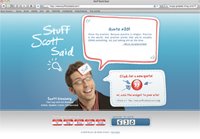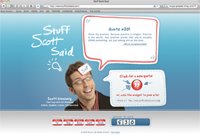 1. Articulate strategy and ideas in plain language. The less jargon you use, the more engaging you become.
1. Articulate strategy and ideas in plain language. The less jargon you use, the more engaging you become.
PRACTICE: In the writing world, shorter sentences get read. In the speaking world, shorter sentences get HEARD. So, think like a writer. Watch those long and cumbersome sentences. Don’t construct your ideas in a way that overburdens people’s brains.
For example, some leaders/managers spew one idea after another. Meanwhile, listeners are still stuck on the FIRST one, trying to figure out what heck you meant. Be careful. Non-brilliance might be forgivable, but time wasting isn’t. Keep your message lean, low-carb and plucked of nonessential words.
LET ME ASK YA THIS: Could a fifth grader understand you?
2. Share information in a clear and concise manner. People are swamped, people are stressed, and they don’t have time to decode your hieroglyphics.
PRACTICE: As a writer, speaker and teacher myself, I’ve discovered the secret to raising receptivity. What’s more, the secret to making your messages more listenable, readable, digestible and learnable.
Three words: Meaningful Concrete Immediacy.
Here’s a rapid-fire list of strategies to do so: No jargon. Chunk ideas into small clusters. No stupid metaphors, bromides or unclear analogies like Dr. Phil loves to use. No vague language. Speak with value, not vanity. Hook moments to personal meaning. Get passion involved. Give people the meat. Zero into the heart of the matter. Package truth as nuggets. Meaningful Concrete Immediacy. Got it? Cool.
LET ME ASK YA THIS: How are you making it hard for people to listen to you?
3. Create a zone of respect around you without being overbearing. Those who build credibility into everything they do are listened to.
PRACTICE: Beware of unspecified attribution. This is my #1 pet peeve of all time. Delete the following vague, non-believable phrases from your vocabulary:
Studies show. Recent research proves. Scientists say. Psychologists report. Experts believe. They say. There’s an old story that says. I’ve heard. Most people agree. It is said that. Critics say. Statistics show. Somebody once said. The reviews say.
Um, no, they DON’T. None of that is good enough. In a conversation. In a speech. In an article. In a presentation. You need to PROVE your point. With facts. Sources. Numbers. Dates. Otherwise people have no reason to believe you.
Remember: Credibility comes from specificity. If you can’t cite a source, keep your mouth shut. Something isn’t always better than nothing.
LET ME ASK YA THIS: What is preventing people from taking you seriously?
4. When it’s a technical matter, (still) speak English. The problem isn’t that people never listen to you; the problem is that you’re not a listenable person.
PRACTICE: Pamper people’s short-term memory. It can handle about seven bits of information at a time. (Ahem, phone numbers.) Your challenge is to do everything you can to accommodate its capacity.
So, include a structure that will serve as an index for the material, i.e., “This process has four steps.” Then, at the end, sum it up, i.e., “Ok, so, to review, the first step was…”
That’s the secret: Making it easy for people to organize and remember material.
LET ME ASK YA THIS: How could you send this message so it gets through the clearest and quickest?
5. Communicate reasons for changes and decisions. Assuming that people know why you’re doing ANYTHING is dangerous.
PRACTICE: Don’t defend yourself; explain yourself. Make your motivations and intentions crystal clear. When you tell people why, they’re more likely to (1) believe you, (2) understand you, and (3) respond TO you.
Otherwise, people’s guesswork of your expectations leads to sub par performance. And eventually, when you yell at them for screwing up, they’ll explain that it was YOUR cloudy communication that caused it. D’oh!
LET ME ASK YA THIS: What is causing you to be easily misunderstood?
6. Share relevant insights and personal experiences. Pointless stories with zero applicability may or may not cause death by boredom to set in.
PRACTICE: Yes, you honor people greatly with your openness; but you also annoy people enormously with your irrelevancy. So, here’s the secret: Make your ideas applicable and actionable. As in, “How does the story I’m about to tell affect this person’s daily life TODAY?”
Because if it doesn’t, don’t tell it. And look, I’m all for Managing by Storying Around (great book, btw). But for the love of God, if you DO tell stories, make sure they’re packaged with instant keepers and takeaways grounded in universal human experiences.
Fluff accomplishes nothing. As Steve Martin so eloquently put it in Planes, Trains and Automobiles, “Hey, here’s an idea: When you tell a story – have a point! It makes it so much more interesting for the listener!”
LET ME ASK YA THIS: Does your insight leave the impression of value or vanity in people’s minds?
Good luck!
LET ME ASK THIS…
When you talk, why do people listen?
LET ME SUGGEST THIS…
For the list called, “23 Ways to Bring More of Yourself to Any Situation,” send an email to me, and I’ll send you the list for free!
* * * *
Scott Ginsberg
That Guy with the Nametag
Author, Speaker, Coach, Entrepreneur
[email protected]
 Who’s quoting YOU?
Who’s quoting YOU?
Check out Scott’s Online Quotation Database for a bite-sized education on branding success!

 “Nobody around here ever listens to me!”
“Nobody around here ever listens to me!” Who’s quoting YOU?
Who’s quoting YOU?